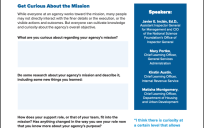 After a year of hosting informal events to introduce their friends and colleagues directly to other friends who were running for office, Austinites Nathan Ryan and Liz Coufal looked at the growing crowds and realized they had tapped into something bigger than themselves.
After a year of hosting informal events to introduce their friends and colleagues directly to other friends who were running for office, Austinites Nathan Ryan and Liz Coufal looked at the growing crowds and realized they had tapped into something bigger than themselves.
The pair had originally started convening modest get-togethers with candidates to try to help offset Texas’ notoriously low civic engagement rate. Based on figures from the 2016 general election, the state ranked 44th in voter registration and 47th in voter turnout among the 50 states and the District of Columbia.
Even in Austin, the left-leaning “blueberry” in the red “tomato soup” of Texas, the voter engagement rate is nothing to write home about.
Ryan, a business process consultant, and Coufal, hailing from Austin’s growing tech sector, theorized that by providing low-stress opportunities to talk about politics and by bringing potential voters face-to-face with the candidates who were hoping to serve them, they might increase civic engagement and overcome some of the reasons people gave for not voting.
And when their casual events started drawing more than a hundred guests at a time, they knew it was time to scale.
Time for Good Politics
Ryan and Coufal refined their idea of using events to bring what they call “good people” into the political process. The result was the launch of a formal series of nonpartisan, big tent “political parties” called Good Politics.
In a recent Medium article, Ryan explains that these events “are designed to encourage people…to stop sitting on the sidelines, get involved and support, not just good causes, but good candidates.”
He continued, “Our politics have a deficit of character because our political process discourages too many people, making them feel like their voice doesn’t matter (it does), that change isn’t possible (it is), and that political leaders are only in the game for their own self-enrichment, not to serve the public (unfortunately, that last part may be true… for now).”
“It’s up to us to change that last one by getting more involved ourselves and by encouraging other good people to get involved as well.”
Good Goals
Ryan and Coufal are clear that their doors are open to all. “We want good people to run, no matter what party,” said Ryan.
Good Politics is intentionally not an organization, nonprofit or otherwise. They don’t take donations and they don’t pass donations on to candidates.
Their events are free and held in popular Austin spots. Guests buy their own drinks, and candidates have one-on-one conversations with attendees who may or may not agree with them, or, just as likely, may have no idea who they are yet.
“We want to destigmatize the perception that talking about politics is bad or awkward,” said Ryan. “People have gotten to the point where we sometimes just avoid talking to others we think we may disagree with. It feels as though every space is a Thanksgiving dinner table. No one wants to bum everybody out.”
“But if we want our leaders to reach across the aisle, we need to show that we want that,” Ryan said. “And more than that, we need to model that behavior.”
Good Conversation
“This isn’t about civility,” he emphasized. “This is about creating an environment where people can have honest conversations again.”
“Of course, we hope those conversations are civil. But our ultimate goal is that they’re real and maybe even a little uncomfortable at times. That discomfort ultimately gives way to better solutions.”
Part of the trick is getting past a self-imposed “knowledge barrier,” he noted. People often opt out of political conversations because they think they have to engage as a fully-briefed wonk.
But that’s not the case at Good Politics events, Ryan said. “You don’t need to be an expert on impervious cover or marginal tax rates. The only authority you need is to live here.”
That openness boosts engagement and makes it easy for people to ask questions they might otherwise keep to themselves, such as, “How is a city council member that different from a congressman?” Meeting people where they are facilitates deeper conversations, noted Ryan, and fosters that sense of curiosity so essential to building community.
What’s Next for Engagement?
Good Politics officially launched on August 23, 2018. The event commanded nearly 400 attendees – with no advertising, no budget and no celebrity guests.
Next steps for Ryan and Coufal are taking in feedback from the launch event, getting through a few events designed to activate voters around the midterms and developing a “kitchen cabinet” of advisors by the end of the year.
And they’ll be doing a lot of work in November to get out the vote. The good news is that they’ll have a lot of newly engaged voters with them.
You can follow Good Politics on Facebook and Twitter.
Jennifer Houlihan is part of the GovLoop Featured Contributor program, where we feature articles by government voices from all across the country (and world!). To see more Featured Contributor posts, click here.





Thank you for this article! This topic is near and dear to my heart. I’m grateful to live in Minnesota where there’s higher voter turnout than in many states. But, there can and should always be more involvement and engagement. This is particularly important now!